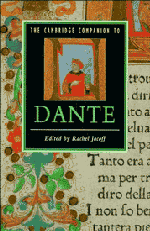Book contents
- Frontmatter
- 1 Life of Dante
- 2 Dante and the lyric past
- 3 Approaching the Vita nuova
- 4 The unfinished author
- 5 Dante and the empire
- 6 Dante and Florence
- 7 Dante and the classical poets
- 8 Dante and the Bible
- 9 The theology of Dante
- 10 A poetics of chaos and harmony
- 11 Introduction to Inferno
- 12 Introduction to Purgatorio
- 13 "Shadowy prefaces"
- 14 Dante and his commentators
- 15 Dante in English
- Further reading
- Index
7 - Dante and the classical poets
Published online by Cambridge University Press: 28 May 2006
- Frontmatter
- 1 Life of Dante
- 2 Dante and the lyric past
- 3 Approaching the Vita nuova
- 4 The unfinished author
- 5 Dante and the empire
- 6 Dante and Florence
- 7 Dante and the classical poets
- 8 Dante and the Bible
- 9 The theology of Dante
- 10 A poetics of chaos and harmony
- 11 Introduction to Inferno
- 12 Introduction to Purgatorio
- 13 "Shadowy prefaces"
- 14 Dante and his commentators
- 15 Dante in English
- Further reading
- Index
Summary
Introduction: mimesis and literary models
ALTHOUGH all medieval literature in the romance vernaculars may be characterized – even defined – as a sustained, dynamic response to the classical canon, Dante's Divina Commedia is an altogether exceptional case. For, in a variety of fundamental ways, the entire Commedia is built on a series of extended encounters with four Latin poets: Virgil, Statius, Lucan, and Ovid. The Commedia's plot line figures these encounters in four principal (and interrelated) manners: First, Dante-protagonist meets and interacts with all four poets, who are characters in his poem. Second, Dante-protagonist undergoes (and/or witnesses) a series of key experiences that are visibly modelled on narrative events from the Aeneid, the Thebaid, the Pharsalia, and the Metamorphoses. The most important, frequent, and systematic instances of this process involve two alternatives: either Dante-protagonist functions as a new, Christian Aeneas, modeled on the single protagonist of Virgil's epic; or he functions as a corrected version of one of the many protagonists of Ovid's multi-narrative epic.
- Type
- Chapter
- Information
- The Cambridge Companion to Dante , pp. 100 - 119Publisher: Cambridge University PressPrint publication year: 1993
- 4
- Cited by

